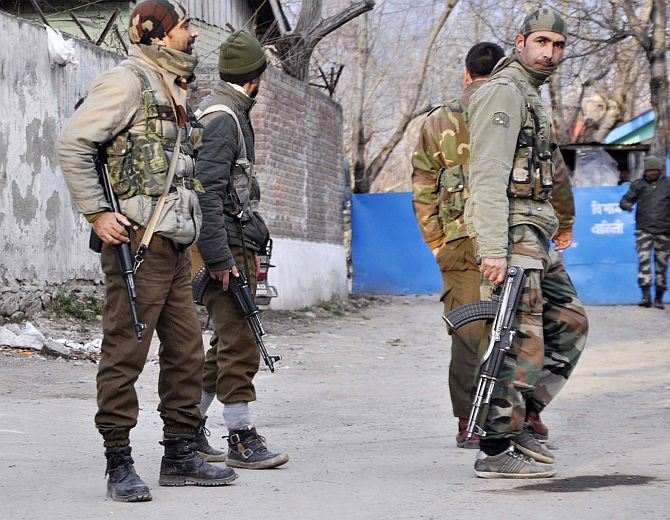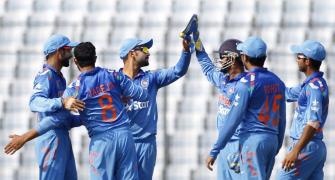
Colonel M N Rai's supreme sacrifice highlights that the Indian Army continues to be led from the front by its officers, says Nitin A Gokhale.
The acronyms AC (Ashok Chakra), SC (Shaurya Chakra), YSM (Yudh Seva Medal), SM (Sena Medal) may not mean a good deal to many when the gallantry award winners are announced on the eve of Republic Day. But for those wearing the uniform, it means the world.
And so it was for Colonel M N Rai, originally of the 9 Gorkha Rifles, commanding the 42 Rashtriya Rifles unit near Tral in South Kashmir on January 25.
He was receiving congratulatory message from course mates and family for being awarded the Yudh Seva medal for exceptional work in war or war-like situation.
Colonel Rai's martyrdom on Tuesday, just 48 hours after being given a prestigious military honour for exemplary leadership of his unit, highlights the dangers of a 'no-war, no peace' condition in Kashmir, fuelled by Pakistan's relentless effort to foment trouble in the border state.
The colonel, who was hit by a bullet from charging terrorists holed up inside a house, shows that the Indian Army continues to be led from the front by its officers.
By all accounts, when a specific input about the presence of two terrorists was received, Colonel Rai led his QRT (Quick Reaction Team), taking along a team from the Special Operations Group of the Jammu and Kashmir Police and rushed to the spot.
In normal circumstances, the operation would have been led by a younger, junior officer. But since there were other ongoing operations, Colonel Rai himself led the team to the house where the terrorists were holed up.
Even as the team was planning its operation, both the cornered terrorists rushed out firing indiscriminately. One bullet pierced Colonel Rai's temple, another hit Head Constable Sanjiv Kumar of the J&K Police in the stomach, killing them both.
Colonel Rai's radio operator was injured along with two others, while the terrorists were eliminated by the rest of the team.
Tuesday's encounter fits the pattern observed in Kashmir over the past couple of years. Every night -- and at times in the day -- at least 1,000-odd patrol parties go out across Jammu and Kashmir, sometimes based on specific information but on most occasions for domination, lest terrorists have a free run in the countryside and along the Line of Control.
Most of them return empty-handed. One team returns, the other goes out.
Day in day out the cycle is repeated. The monotony can be killing.
But there is no other choice. Lowering guard is not an option that Indian security forces in Kashmir have.
In 2014, considered one of the more 'peaceful' years in recent times, 104 terrorists were eliminated, but 28 army men sacrificed their lives in the process.
In January this year, eight terrorists have been killed but at a high cost to security personnel. Four army personnel and two from other forces made the supreme sacrifice in the operations, highlighting the cost that the endless war in Kashmir extracts.
There is no sign that Pakistan is going to turn off the tap that pushes terrorists across the LoC. The relentless daily war will not go away soon either.
That is the reality of Kashmir that must be understood by the citizens of this country.
Image: Troops of the Indian Army's Special Operations Group and the Jammu and Kashmir Police at the encounter site in Tral, south Kashmir. Photograph: Umar Ganie









